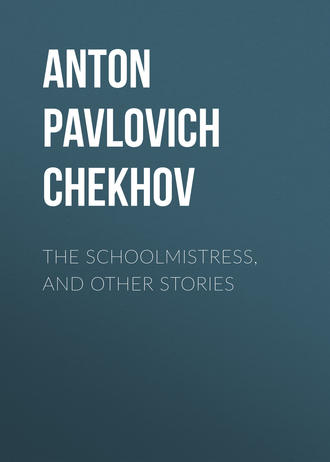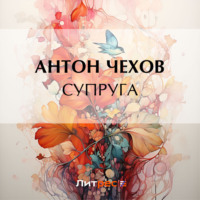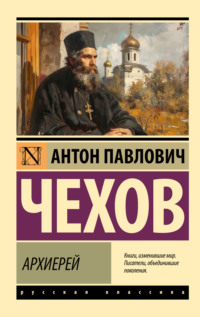 полная версия
полная версияThe Schoolmistress, and Other Stories
“Well, you give him a little encouragement… one in the neck!”
“Do you hear, you old plague? I’ll make you smart. If one stands on ceremony with fellows like you one may as well walk. Do you hear, you old dragon? Or don’t you care a hang what we say?”
And Iona hears rather than feels a slap on the back of his neck.
“He-he!..” he laughs. “Merry gentlemen… God give you health!”
“Cabman, are you married?” asks one of the tall ones.
“I? He he! Me-er-ry gentlemen. The only wife for me now is the damp earth… He-ho-ho!.. The grave that is!.. Here my son’s dead and I am alive… It’s a strange thing, death has come in at the wrong door… Instead of coming for me it went for my son…”
And Iona turns round to tell them how his son died, but at that point the hunchback gives a faint sigh and announces that, thank God! they have arrived at last. After taking his twenty kopecks, Iona gazes for a long while after the revelers, who disappear into a dark entry. Again he is alone and again there is silence for him… The misery which has been for a brief space eased comes back again and tears his heart more cruelly than ever. With a look of anxiety and suffering Iona’s eyes stray restlessly among the crowds moving to and fro on both sides of the street: can he not find among those thousands someone who will listen to him? But the crowds flit by heedless of him and his misery… His misery is immense, beyond all bounds. If Iona’s heart were to burst and his misery to flow out, it would flood the whole world, it seems, but yet it is not seen. It has found a hiding-place in such an insignificant shell that one would not have found it with a candle by daylight…
Iona sees a house-porter with a parcel and makes up his mind to address him.
“What time will it be, friend?” he asks.
“Going on for ten… Why have you stopped here? Drive on!”
Iona drives a few paces away, bends himself double, and gives himself up to his misery. He feels it is no good to appeal to people. But before five minutes have passed he draws himself up, shakes his head as though he feels a sharp pain, and tugs at the reins… He can bear it no longer.
“Back to the yard!” he thinks. “To the yard!”
And his little mare, as though she knew his thoughts, falls to trotting. An hour and a half later Iona is sitting by a big dirty stove. On the stove, on the floor, and on the benches are people snoring. The air is full of smells and stuffiness. Iona looks at the sleeping figures, scratches himself, and regrets that he has come home so early…
“I have not earned enough to pay for the oats, even,” he thinks. “That’s why I am so miserable. A man who knows how to do his work… who has had enough to eat, and whose horse has had enough to eat, is always at ease…”
In one of the corners a young cabman gets up, clears his throat sleepily, and makes for the water-bucket.
“Want a drink?” Iona asks him.
“Seems so.”
“May it do you good… But my son is dead, mate… Do you hear? This week in the hospital… It’s a queer business…”
Iona looks to see the effect produced by his words, but he sees nothing. The young man has covered his head over and is already asleep. The old man sighs and scratches himself… Just as the young man had been thirsty for water, he thirsts for speech. His son will soon have been dead a week, and he has not really talked to anybody yet… He wants to talk of it properly, with deliberation… He wants to tell how his son was taken ill, how he suffered, what he said before he died, how he died… He wants to describe the funeral, and how he went to the hospital to get his son’s clothes. He still has his daughter Anisya in the country… And he wants to talk about her too… Yes, he has plenty to talk about now. His listener ought to sigh and exclaim and lament… It would be even better to talk to women. Though they are silly creatures, they blubber at the first word.
“Let’s go out and have a look at the mare,” Iona thinks. “There is always time for sleep… You’ll have sleep enough, no fear…”
He puts on his coat and goes into the stables where his mare is standing. He thinks about oats, about hay, about the weather… He cannot think about his son when he is alone… To talk about him with someone is possible, but to think of him and picture him is insufferable anguish…
“Are you munching?” Iona asks his mare, seeing her shining eyes. “There, munch away, munch away… Since we have not earned enough for oats, we will eat hay… Yes… I have grown too old to drive… My son ought to be driving, not I… He was a real cabman… He ought to have lived…”
Iona is silent for a while, and then he goes on:
“That’s how it is, old girl… Kuzma Ionitch is gone… He said good-by to me… He went and died for no reason… Now, suppose you had a little colt, and you were own mother to that little colt. … And all at once that same little colt went and died… You’d be sorry, wouldn’t you?..”
The little mare munches, listens, and breathes on her master’s hands. Iona is carried away and tells her all about it.
CHAMPAGNE
A WAYFARER’S STORYIN the year in which my story begins I had a job at a little station on one of our southwestern railways. Whether I had a gay or a dull life at the station you can judge from the fact that for fifteen miles round there was not one human habitation, not one woman, not one decent tavern; and in those days I was young, strong, hot-headed, giddy, and foolish. The only distraction I could possibly find was in the windows of the passenger trains, and in the vile vodka which the Jews drugged with thorn-apple. Sometimes there would be a glimpse of a woman’s head at a carriage window, and one would stand like a statue without breathing and stare at it until the train turned into an almost invisible speck; or one would drink all one could of the loathsome vodka till one was stupefied and did not feel the passing of the long hours and days. Upon me, a native of the north, the steppe produced the effect of a deserted Tatar cemetery. In the summer the steppe with its solemn calm, the monotonous chur of the grasshoppers, the transparent moonlight from which one could not hide, reduced me to listless melancholy; and in the winter the irreproachable whiteness of the steppe, its cold distance, long nights, and howling wolves oppressed me like a heavy nightmare. There were several people living at the station: my wife and I, a deaf and scrofulous telegraph clerk, and three watchmen. My assistant, a young man who was in consumption, used to go for treatment to the town, where he stayed for months at a time, leaving his duties to me together with the right of pocketing his salary. I had no children, no cake would have tempted visitors to come and see me, and I could only visit other officials on the line, and that no oftener than once a month.
I remember my wife and I saw the New Year in. We sat at table, chewed lazily, and heard the deaf telegraph clerk monotonously tapping on his apparatus in the next room. I had already drunk five glasses of drugged vodka, and, propping my heavy head on my fist, thought of my overpowering boredom from which there was no escape, while my wife sat beside me and did not take her eyes off me. She looked at me as no one can look but a woman who has nothing in this world but a handsome husband. She loved me madly, slavishly, and not merely my good looks, or my soul, but my sins, my ill-humor and boredom, and even my cruelty when, in drunken fury, not knowing how to vent my ill-humor, I tormented her with reproaches.
In spite of the boredom which was consuming me, we were preparing to see the New Year in with exceptional festiveness, and were awaiting midnight with some impatience. The fact is, we had in reserve two bottles of champagne, the real thing, with the label of Veuve Clicquot; this treasure I had won the previous autumn in a bet with the station-master of D. when I was drinking with him at a christening. It sometimes happens during a lesson in mathematics, when the very air is still with boredom, a butterfly flutters into the class-room; the boys toss their heads and begin watching its flight with interest, as though they saw before them not a butterfly but something new and strange; in the same way ordinary champagne, chancing to come into our dreary station, roused us. We sat in silence looking alternately at the clock and at the bottles.
When the hands pointed to five minutes to twelve I slowly began uncorking a bottle. I don’t know whether I was affected by the vodka, or whether the bottle was wet, but all I remember is that when the cork flew up to the ceiling with a bang, my bottle slipped out of my hands and fell on the floor. Not more than a glass of the wine was spilt, as I managed to catch the bottle and put my thumb over the foaming neck.
“Well, may the New Year bring you happiness!” I said, filling two glasses. “Drink!”
My wife took her glass and fixed her frightened eyes on me. Her face was pale and wore a look of horror.
“Did you drop the bottle?” she asked.
“Yes. But what of that?”
“It’s unlucky,” she said, putting down her glass and turning paler still. “It’s a bad omen. It means that some misfortune will happen to us this year.”
“What a silly thing you are,” I sighed. “You are a clever woman, and yet you talk as much nonsense as an old nurse. Drink.”
“God grant it is nonsense, but… something is sure to happen! You’ll see.”
She did not even sip her glass, she moved away and sank into thought. I uttered a few stale commonplaces about superstition, drank half a bottle, paced up and down, and then went out of the room.
Outside there was the still frosty night in all its cold, inhospitable beauty. The moon and two white fluffy clouds beside it hung just over the station, motionless as though glued to the spot, and looked as though waiting for something. A faint transparent light came from them and touched the white earth softly, as though afraid of wounding her modesty, and lighted up everything – the snowdrifts, the embankment… It was still.
I walked along the railway embankment.
“Silly woman,” I thought, looking at the sky spangled with brilliant stars. “Even if one admits that omens sometimes tell the truth, what evil can happen to us? The misfortunes we have endured already, and which are facing us now, are so great that it is difficult to imagine anything worse. What further harm can you do a fish which has been caught and fried and served up with sauce?”
A poplar covered with hoar frost looked in the bluish darkness like a giant wrapt in a shroud. It looked at me sullenly and dejectedly, as though like me it realized its loneliness. I stood a long while looking at it.
“My youth is thrown away for nothing, like a useless cigarette end,” I went on musing. “My parents died when I was a little child; I was expelled from the high school, I was born of a noble family, but I have received neither education nor breeding, and I have no more knowledge than the humblest mechanic. I have no refuge, no relations, no friends, no work I like. I am not fitted for anything, and in the prime of my powers I am good for nothing but to be stuffed into this little station; I have known nothing but trouble and failure all my life. What can happen worse?”
Red lights came into sight in the distance. A train was moving towards me. The slumbering steppe listened to the sound of it. My thoughts were so bitter that it seemed to me that I was thinking aloud and that the moan of the telegraph wire and the rumble of the train were expressing my thoughts.
“What can happen worse? The loss of my wife?” I wondered. “Even that is not terrible. It’s no good hiding it from my conscience: I don’t love my wife. I married her when I was only a wretched boy; now I am young and vigorous, and she has gone off and grown older and sillier, stuffed from her head to her heels with conventional ideas. What charm is there in her maudlin love, in her hollow chest, in her lusterless eyes? I put up with her, but I don’t love her. What can happen? My youth is being wasted, as the saying is, for a pinch of snuff. Women flit before my eyes only in the carriage windows, like falling stars. Love I never had and have not. My manhood, my courage, my power of feeling are going to ruin… Everything is being thrown away like dirt, and all my wealth here in the steppe is not worth a farthing.”
The train rushed past me with a roar and indifferently cast the glow of its red lights upon me. I saw it stop by the green lights of the station, stop for a minute and rumble off again. After walking a mile and a half I went back. Melancholy thoughts haunted me still. Painful as it was to me, yet I remember I tried as it were to make my thoughts still gloomier and more melancholy. You know people who are vain and not very clever have moments when the consciousness that they are miserable affords them positive satisfaction, and they even coquet with their misery for their own entertainment. There was a great deal of truth in what I thought, but there was also a great deal that was absurd and conceited, and there was something boyishly defiant in my question: “What could happen worse?”
“And what is there to happen?” I asked myself. “I think I have endured everything. I’ve been ill, I’ve lost money, I get reprimanded by my superiors every day, and I go hungry, and a mad wolf has run into the station yard. What more is there? I have been insulted, humiliated… and I have insulted others in my time. I have not been a criminal, it is true, but I don’t think I am capable of crime – I am not afraid of being hauled up for it.”
The two little clouds had moved away from the moon and stood at a little distance, looking as though they were whispering about something which the moon must not know. A light breeze was racing across the steppe, bringing the faint rumble of the retreating train.
My wife met me at the doorway. Her eyes were laughing gaily and her whole face was beaming with good-humor.
“There is news for you!” she whispered. “Make haste, go to your room and put on your new coat; we have a visitor.”
“What visitor?”
“Aunt Natalya Petrovna has just come by the train.”
“What Natalya Petrovna?”
“The wife of my uncle Semyon Fyodoritch. You don’t know her. She is a very nice, good woman.”
Probably I frowned, for my wife looked grave and whispered rapidly:
“Of course it is queer her having come, but don’t be cross, Nikolay, and don’t be hard on her. She is unhappy, you know; Uncle Semyon Fyodoritch really is ill-natured and tyrannical, it is difficult to live with him. She says she will only stay three days with us, only till she gets a letter from her brother.”
My wife whispered a great deal more nonsense to me about her despotic uncle; about the weakness of mankind in general and of young wives in particular; about its being our duty to give shelter to all, even great sinners, and so on. Unable to make head or tail of it, I put on my new coat and went to make acquaintance with my “aunt.”
A little woman with large black eyes was sitting at the table. My table, the gray walls, my roughly-made sofa, everything to the tiniest grain of dust seemed to have grown younger and more cheerful in the presence of this new, young, beautiful, and dissolute creature, who had a most subtle perfume about her. And that our visitor was a lady of easy virtue I could see from her smile, from her scent, from the peculiar way in which she glanced and made play with her eyelashes, from the tone in which she talked with my wife – a respectable woman. There was no need to tell me she had run away from her husband, that her husband was old and despotic, that she was good-natured and lively; I took it all in at the first glance. Indeed, it is doubtful whether there is a man in all Europe who cannot spot at the first glance a woman of a certain temperament.
“I did not know I had such a big nephew!” said my aunt, holding out her hand to me and smiling.
“And I did not know I had such a pretty aunt,” I answered.
Supper began over again. The cork flew with a bang out of the second bottle, and my aunt swallowed half a glassful at a gulp, and when my wife went out of the room for a moment my aunt did not scruple to drain a full glass. I was drunk both with the wine and with the presence of a woman. Do you remember the song?
“Eyes black as pitch, eyes full of passion, Eyes burning bright and beautiful, How I love you, How I fear you!”I don’t remember what happened next. Anyone who wants to know how love begins may read novels and long stories; I will put it shortly and in the words of the same silly song:
“It was an evil hour When first I met you.”Everything went head over heels to the devil. I remember a fearful, frantic whirlwind which sent me flying round like a feather. It lasted a long while, and swept from the face of the earth my wife and my aunt herself and my strength. From the little station in the steppe it has flung me, as you see, into this dark street.
Now tell me what further evil can happen to me?
AFTER THE THEATRE
NADYA ZELENIN had just come back with her mamma from the theatre where she had seen a performance of “Yevgeny Onyegin.” As soon as she reached her own room she threw off her dress, let down her hair, and in her petticoat and white dressing-jacket hastily sat down to the table to write a letter like Tatyana’s.
“I love you,” she wrote, “but you do not love me, do not love me!”
She wrote it and laughed.
She was only sixteen and did not yet love anyone. She knew that an officer called Gorny and a student called Gruzdev loved her, but now after the opera she wanted to be doubtful of their love. To be unloved and unhappy – how interesting that was. There is something beautiful, touching, and poetical about it when one loves and the other is indifferent. Onyegin was interesting because he was not in love at all, and Tatyana was fascinating because she was so much in love; but if they had been equally in love with each other and had been happy, they would perhaps have seemed dull.
“Leave off declaring that you love me,” Nadya went on writing, thinking of Gorny. “I cannot believe it. You are very clever, cultivated, serious, you have immense talent, and perhaps a brilliant future awaits you, while I am an uninteresting girl of no importance, and you know very well that I should be only a hindrance in your life. It is true that you were attracted by me and thought you had found your ideal in me, but that was a mistake, and now you are asking yourself in despair: ‘Why did I meet that girl?’ And only your goodness of heart prevents you from owning it to yourself…”
Nadya felt sorry for herself, she began to cry, and went on:
“It is hard for me to leave my mother and my brother, or I should take a nun’s veil and go whither chance may lead me. And you would be left free and would love another. Oh, if I were dead!”
She could not make out what she had written through her tears; little rainbows were quivering on the table, on the floor, on the ceiling, as though she were looking through a prism. She could not write, she sank back in her easy-chair and fell to thinking of Gorny.
My God! how interesting, how fascinating men were! Nadya recalled the fine expression, ingratiating, guilty, and soft, which came into the officer’s face when one argued about music with him, and the effort he made to prevent his voice from betraying his passion. In a society where cold haughtiness and indifference are regarded as signs of good breeding and gentlemanly bearing, one must conceal one’s passions. And he did try to conceal them, but he did not succeed, and everyone knew very well that he had a passionate love of music. The endless discussions about music and the bold criticisms of people who knew nothing about it kept him always on the strain; he was frightened, timid, and silent. He played the piano magnificently, like a professional pianist, and if he had not been in the army he would certainly have been a famous musician.
The tears on her eyes dried. Nadya remembered that Gorny had declared his love at a Symphony concert, and again downstairs by the hatstand where there was a tremendous draught blowing in all directions.
“I am very glad that you have at last made the acquaintance of Gruzdev, our student friend,” she went on writing. “He is a very clever man, and you will be sure to like him. He came to see us yesterday and stayed till two o’clock. We were all delighted with him, and I regretted that you had not come. He said a great deal that was remarkable.”
Nadya laid her arms on the table and leaned her head on them, and her hair covered the letter. She recalled that the student, too, loved her, and that he had as much right to a letter from her as Gorny. Wouldn’t it be better after all to write to Gruzdev? There was a stir of joy in her bosom for no reason whatever; at first the joy was small, and rolled in her bosom like an india-rubber ball; then it became more massive, bigger, and rushed like a wave. Nadya forgot Gorny and Gruzdev; her thoughts were in a tangle and her joy grew and grew; from her bosom it passed into her arms and legs, and it seemed as though a light, cool breeze were breathing on her head and ruffling her hair. Her shoulders quivered with subdued laughter, the table and the lamp chimney shook, too, and tears from her eyes splashed on the letter. She could not stop laughing, and to prove to herself that she was not laughing about nothing she made haste to think of something funny.
“What a funny poodle,” she said, feeling as though she would choke with laughter. “What a funny poodle!”
She thought how, after tea the evening before, Gruzdev had played with Maxim the poodle, and afterwards had told them about a very intelligent poodle who had run after a crow in the yard, and the crow had looked round at him and said: “Oh, you scamp!”
The poodle, not knowing he had to do with a learned crow, was fearfully confused and retreated in perplexity, then began barking…
“No, I had better love Gruzdev,” Nadya decided, and she tore up the letter to Gorny.
She fell to thinking of the student, of his love, of her love; but the thoughts in her head insisted on flowing in all directions, and she thought about everything – about her mother, about the street, about the pencil, about the piano… She thought of them joyfully, and felt that everything was good, splendid, and her joy told her that this was not all, that in a little while it would be better still. Soon it would be spring, summer, going with her mother to Gorbiki. Gorny would come for his furlough, would walk about the garden with her and make love to her. Gruzdev would come too. He would play croquet and skittles with her, and would tell her wonderful things. She had a passionate longing for the garden, the darkness, the pure sky, the stars. Again her shoulders shook with laughter, and it seemed to her that there was a scent of wormwood in the room and that a twig was tapping at the window.
She went to her bed, sat down, and not knowing what to do with the immense joy which filled her with yearning, she looked at the holy image hanging at the back of her bed, and said:
“Oh, Lord God! Oh, Lord God!”
A LADY’S STORY
NINE years ago Pyotr Sergeyitch, the deputy prosecutor, and I were riding towards evening in hay-making time to fetch the letters from the station.
The weather was magnificent, but on our way back we heard a peal of thunder, and saw an angry black storm-cloud which was coming straight towards us. The storm-cloud was approaching us and we were approaching it.
Against the background of it our house and church looked white and the tall poplars shone like silver. There was a scent of rain and mown hay. My companion was in high spirits. He kept laughing and talking all sorts of nonsense. He said it would be nice if we could suddenly come upon a medieval castle with turreted towers, with moss on it and owls, in which we could take shelter from the rain and in the end be killed by a thunderbolt…
Then the first wave raced through the rye and a field of oats, there was a gust of wind, and the dust flew round and round in the air. Pyotr Sergeyitch laughed and spurred on his horse.
“It’s fine!” he cried, “it’s splendid!”
Infected by his gaiety, I too began laughing at the thought that in a minute I should be drenched to the skin and might be struck by lightning.
Riding swiftly in a hurricane when one is breathless with the wind, and feels like a bird, thrills one and puts one’s heart in a flutter. By the time we rode into our courtyard the wind had gone down, and big drops of rain were pattering on the grass and on the roofs. There was not a soul near the stable.









